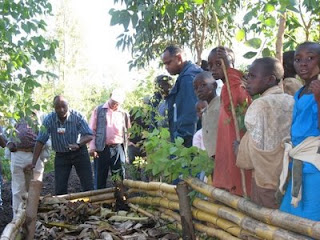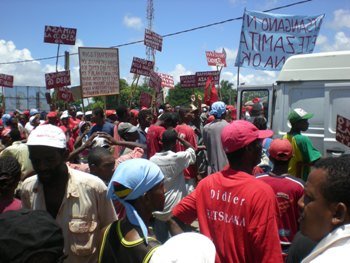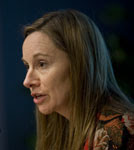-
Specialty Coffee Project Brings Jolt of Attention to Agriculture, Health in Rural Rwanda
›March 9, 2009 // By Rachel Weisshaar A landlocked, impoverished, densely populated country, Rwanda faces steep challenges in the quest to improve the quality of life of its people, who are mostly small-scale farmers. One solution promoted by the Sustaining Partnerships to enhance Rural Enterprise and Agribusiness Development (SPREAD) project, which I visited last month with the leaders of the East Africa Population-Health-Environment (PHE) Network, is helping farmers produce higher-quality crops, which can be sold for premium prices on international markets. In this way, farmers can increase their income by producing better crops, rather than producing more—since in Rwanda, there isn’t any more land to go around.
A landlocked, impoverished, densely populated country, Rwanda faces steep challenges in the quest to improve the quality of life of its people, who are mostly small-scale farmers. One solution promoted by the Sustaining Partnerships to enhance Rural Enterprise and Agribusiness Development (SPREAD) project, which I visited last month with the leaders of the East Africa Population-Health-Environment (PHE) Network, is helping farmers produce higher-quality crops, which can be sold for premium prices on international markets. In this way, farmers can increase their income by producing better crops, rather than producing more—since in Rwanda, there isn’t any more land to go around.
Coffee is Rwanda’s primary export, so SPREAD focuses its efforts there, although it also targets other high-value crops like chili peppers. SPREAD helps organize farmers into cooperatives with their own bylaws and elected leaders; for instance, the highly successful Maraba cooperative includes 1,400 farmers and their families. Agricultural extension agents show farmers techniques for raising the quality of their coffee. One innovation SPREAD has introduced is coffee bikes, which are specially designed eight-speed mountain bikes that can carry up to 300 kg of coffee cherries. SPREAD found that coffee transported to processing stations on the bikes scored 3.5 SCAA quality points higher than coffee transported by foot or truck, due to shorter average times between harvesting and processing.
SPREAD has provided the impetus for the construction of 120 coffee washing stations (CWS) during the past several years, and has also set up three CWS support centers, which assist with quality control. Washing coffee before and after fermentation is key to preserving its quality. SPREAD has made sure to incorporate a number of environmental initiatives into coffee growing and processing, including mulching coffee trees and digging trenches around them to prevent erosion on Rwanda’s steep hillsides; purchasing new water-efficient coffee-washing machines; filtering the CWS wastewater before releasing it into the river; and using vermiculture (worms) to process coffee pulp and mucilage into organic fertilizer. As SPREAD’s Jean Marie Irakabaho put it, growing coffee without caring for the land is like milking a cow without feeding it.
SPREAD has incorporated family planning (FP) and health initiatives into its agricultural work. The same coffee extension workers who teach farmers how to improve the quality of their coffee have been trained to deliver basic health and FP messages and products to them. Working closely with the district government and local health center, SPREAD staff focus primarily on improving maternal and child health; FP; HIV/AIDS prevention, testing, and treatment; and water, sanitation, and hygiene. A weekly radio program, “Imbere Heza” (“Bright Future”), integrates coffee-growing and health information.
SPREAD, which is funded by the U.S. Agency for International Development and led by the Norman Borlaug Institute for International Agriculture at Texas A&M; University, knows it won’t be around forever, so it is striving to make its improvements to Rwandan livelihoods permanent. It created the Rwanda Small Holder Specialty Coffee Company (RWASHOSCCO), a cooperative-owned company that helps cooperatives market and export their coffee. Specialty Rwandan coffee can now be found in online stores like Land of a Thousand Hills Coffee and Allegro Coffee, as well as in cafes around the world. At the East Africa PHE Network workshop, our coffee breaks featured wonderful coffee from the Maraba cooperative. I encourage all coffee connoisseurs to taste for themselves the delicious results of sustained investment in the livelihoods, agriculture, environment, and health of Rwanda’s coffee farmers!
Rachel Weisshaar attended the meeting of the East Africa PHE Network in Kigali, Rwanda. See previous posts on the New Security Beat: “Rwanda: More Than Mountain Gorillas,” “East Africa PHE Network: Translating Strong Results Into Informed Policies,” and “East Africa Population-Health-Environment Conference Kicks Off in Kigali.”
Photo: Jean Marie Irakabaho (left), chief agronomist and coffee research coordinator at SPREAD, shows the beds where worms are being raised to digest coffee pulp and mucilage, while local children look on. Courtesy of Rachel Weisshaar. -
VIDEO: Nick Mabey on Climate Change and Security on the Road to Copenhagen
›March 9, 2009 // By Wilson Center StaffThe security community needs to “tell leaders that they won’t be able to guarantee security in a world where we don’t control climate change,” says Nick Mabey in this video from the Environmental Change and Security Program. “Because unless we have the authority of the security establishment and the foreign policy establishment at the table,” he says, “there’s no chance of both delivering the trillions of dollars needed to create a new clean energy economy, but also mak[ing] those tough choices.”
In this short expert analysis, Nick Mabey, founding director and chief executive of E3G, discusses why security must be at the heart of the upcoming Copenhagen Agreement on Climate Change. -
Weekly Reading
›“A New Military Mission: Clean Energy,” part of the Center for American Progress’ “It’s Easy Being Green” series, highlights the military’s attempts to become more energy-efficient. Read more about the U.S. military’s environmental initiatives.
Simon Dalby, a professor at Carleton College, discusses the evolution of environmental security with John Tessitore, executive editor of the Carnegie Council, in a video interview (transcript available).
Climate Change, Food Security, and the Right to Adequate Food examines climate change’s expected impact on food production, with a special focus on Africa and Asia.
The BDA Foundation, a Canadian charity, and PharmAfrica, a pharmaceutical company, are working to create a medicinal plants industry that will lift local people out of poverty in the Democratic Republic of the Congo. -
Video: Malcolm Potts on ‘Sex and War’
›March 6, 2009 // By Wilson Center Staff“What is the thing that may make the world as peaceful as possible?” asks Malcolm Potts in this video from the Environment Change and Security Program. “I think it’s very important to give women as much autonomy in society as we possibly can; to fight as hard as possible for women’s equality. Because these behaviors that created warriors never benefited women.”
In this short expert analysis, Malcolm Potts, Bixby Professor of Population and Family Planning at the University of California Berkeley, discusses his latest book, Sex and War: How Biology Explains Warfare and Terrorism and Offers a Path to a Safer World. To learn more, please see a full summary and complete video of Malcom Potts speaking recently about his book at a February 11, 2009, Wilson Center event.
-
Mind the Gap: Forging a Consensus on Security and Climate Change in EU and US Foreign Policy
›March 5, 2009 // By Will Rogers “There are political and economic vulnerabilities that are in fact more important—or seem more important—to the participants of conflict than the physical vulnerability to climate change,” said Clionadh Raleigh at the February 19, 2009, event, “Climate Security Roundtable: U.S. and EU Research and Policy.” Raleigh, a lecturer at Trinity College Dublin, was joined by Nick Mabey, founding director and chief executive of E3G, and Sharon Burke, a senior fellow at the Center for a New American Security, to discuss climate change’s impact on conflict and how the United States and European Union (EU) have begun to adapt their foreign and security policies to the threat of climate change.
“There are political and economic vulnerabilities that are in fact more important—or seem more important—to the participants of conflict than the physical vulnerability to climate change,” said Clionadh Raleigh at the February 19, 2009, event, “Climate Security Roundtable: U.S. and EU Research and Policy.” Raleigh, a lecturer at Trinity College Dublin, was joined by Nick Mabey, founding director and chief executive of E3G, and Sharon Burke, a senior fellow at the Center for a New American Security, to discuss climate change’s impact on conflict and how the United States and European Union (EU) have begun to adapt their foreign and security policies to the threat of climate change.
Ecological Change, Migration, and Conflict: A Complex Story
“The lack of access to power for certain communities, certain ethnic groups in sub-Saharan Africa, and basic access to resources among the most vulnerable populations has led to people misinterpreting the relationship that ecological change plays in their decision to either participate in conflict or to migrate,” Raleigh said. Although Raleigh’s research, which examined civil conflicts from 1990 to 2004, found that population density and growth were related to higher risks of conflict, “environmental pressures were not more likely to cause conflict in poor states—and not more likely during periods of instability,” she concluded. “Social, political, and economic factors are the most important determinants of civil war within developing countries,” she emphasized. “Poverty and unequal development come up time and time again.”
According to Raleigh, fears of mass international migration in response to climate change are overplayed. “Individuals and communities have quite a lot of coping mechanisms to deal with ecological difficulty,” including migration from rural to urban areas in the same country, she explained. Most migration, including labor and distress migration, “is temporary, internal, and circular,” she emphasized. “There is very little to no evidence that there will be an increase in international migration” in response to ecological change, although “there is evidence that there will be an increase in internal migration.”
Climate Change and Security: Perspectives from the EU “Climate change is serious,” emphasized Mabey. “It’s a threat multiplier, it will make unstable places less stable—it’s going to change strategic interests, alliances, borders, threats, economic relationships, comparative advantages, the nature of international relations, and the legitimacy of the UN.” In the future, “security policy will need to get more preventive and risk-based because climate change just injects a huge bolt of uncertainty into the future,” said Mabey. He urged the expansion of forward-looking information systems that provide policymakers with the data they need to make decisions at the geopolitical, strategic, and operations levels. He also said security experts should strive to communicate the potential consequences of climate change to decisionmakers.
“Climate change is serious,” emphasized Mabey. “It’s a threat multiplier, it will make unstable places less stable—it’s going to change strategic interests, alliances, borders, threats, economic relationships, comparative advantages, the nature of international relations, and the legitimacy of the UN.” In the future, “security policy will need to get more preventive and risk-based because climate change just injects a huge bolt of uncertainty into the future,” said Mabey. He urged the expansion of forward-looking information systems that provide policymakers with the data they need to make decisions at the geopolitical, strategic, and operations levels. He also said security experts should strive to communicate the potential consequences of climate change to decisionmakers.
The EU has taken steps to integrate climate change into its security strategy; Great Britain, Germany, and Denmark have taken the lead. The Arctic has been a particular focus, with security experts examining trade routes, maritime zones, and new access to resources. Climate change “is not all about instability” in fragile, impoverished states, Mabey explained. “The Arctic is by far the most important climate security issue in the minds of traditional foreign-policy types in Europe.”
Environmental Security Gets a New Tool: The Climate War Game Last year, Burke helped conduct a climate change war game based on a scenario of extreme weather events like droughts, wildfires, and cyclones. “Every country sort of hewed to what you would expect,” said Burke of the high-profile participants from China, India, Europe, and the United States. “The EU team spent the first two hours debating whether they could really be a country; the Indian team instantly came up with a negotiating strategy that sounded cooperative and brilliant but was completely impossible to execute; the Chinese team was, ‘No, we’re not going to do anything unless you pay us’; and the American team was keen to lead, only nobody was following.” One of the key lessons from the game, Burke explained, was that “everything comes down to what China is prepared to do.”
Last year, Burke helped conduct a climate change war game based on a scenario of extreme weather events like droughts, wildfires, and cyclones. “Every country sort of hewed to what you would expect,” said Burke of the high-profile participants from China, India, Europe, and the United States. “The EU team spent the first two hours debating whether they could really be a country; the Indian team instantly came up with a negotiating strategy that sounded cooperative and brilliant but was completely impossible to execute; the Chinese team was, ‘No, we’re not going to do anything unless you pay us’; and the American team was keen to lead, only nobody was following.” One of the key lessons from the game, Burke explained, was that “everything comes down to what China is prepared to do.”
In developing the game, Burke and her colleagues discovered “that there’s a vast poverty of the kinds of information that you need to make decisions.” As Burke explained, policymakers need specific data “to obligate large amounts of money and personnel,” and the game revealed that “policymakers don’t have the information they need to make decisions.”
Photos: From top to bottom, Clionadh Raleigh, Nick Mabey, and Sharon Burke. Courtesy of Dave Hawxhurst and the Woodrow Wilson Center. -
VIDEO: From Report 13 – Christian Leuprecht on Migration as the Demographic Wild Card in Civil Conflict
›March 3, 2009 // By Wilson Center StaffContrary to what many people might think, most migration is within the developing world—“among countries that already face enormous challenges in terms of provisions for their populations, but also ethnic conflict,” says Christian Leuprecht in this short video preview of his article, “Migration as the Demographic Wild Card in Civil Conflict: Mauritius and Fiji,” now appearing in the 13th issue of Environmental Change and Security Program Report.
“So if you have particular ethnic groups, religious groups, or linguistic groups then spilling over borders, there’s a good chance they might destabilize the neighboring country; not just because of carrying capacity and provision of services within that country, but also because it changes the population dynamics and group dynamics within that particular country,” says Leuprecht.
Leuprecht, an assistant professor at the Royal Military College of Canada, and six other demographic experts analyze the links connecting population and environmental dynamics to conflict in a set of commentaries on “New Directions in Demographic Security.” -
In Land Grab, Food Is Not the Only Consideration
›March 3, 2009 // By Will Rogers Global cereal production – including stable items like wheat, coarse grains, and rice – is projected to shrink in 2009 due to drought and adverse weather in the world’s major producers. With shrinking food stocks, a growing demand for biofuels, and a need for cheaper sources of raw materials like rubber and other natural resources, governments and corporations in many developed countries are seeking to secure access to these coveted commodities by leasing large tracts of land in developing countries.
Global cereal production – including stable items like wheat, coarse grains, and rice – is projected to shrink in 2009 due to drought and adverse weather in the world’s major producers. With shrinking food stocks, a growing demand for biofuels, and a need for cheaper sources of raw materials like rubber and other natural resources, governments and corporations in many developed countries are seeking to secure access to these coveted commodities by leasing large tracts of land in developing countries.
In Indonesia, PT Daewoo Logistics Indonesia, a subsidiary of South Korea’s Daewoo Logistics Corporation, and Cheil Jedang Samsung recently announced a partnership to invest US $50 million to grow and process energy crops on the islands of Buru and Samba. The two companies will produce 30,000 tons of corn grain a year on 24,000 hectares and will export their entire production back to South Korea. The announcement comes on the heels of a report from the International Food Policy Research Institute, The Challenge of Hunger: The 2008 Global Hunger Index, that raises concerns about Indonesia’s already precarious food security.
Meanwhile, Saudi investors have been lobbying government officials in the Philippines to grow and export “basmati rice, corn, cassava, sugar, animal fodder, fisheries, red meat, Philippine bananas and mangoes,” reports Neil Morales in BusinessWorld. Philippine officials are hoping to leverage Saudi Arabia’s growing demand for food against the harsh economic climate to boost much-needed foreign direct investment. “Tell me an item that the whole world needs regardless of the economic situation, it is food,” said Peter Favila, the Philippine Trade Secretary, in an interview with BusinessWorld.
But securing food stocks is not the only motive behind the massive leasing of land in developing countries. A surging demand for biofuels to meet energy needs, as well as access to new sources of raw materials for manufacturing goods, appears to be driving recent land grabs. Recently, Sinopec and The Chinese National Overseas Oil Corporation, two state-owned oil giants, made investments of US $5 billion and $5.5 billion, respectively, in Indonesia to grow and process corn into biofuel to be exported to China.
Meanwhile, several Chinese companies have secured deals in Southeast Asia to grow rubber trees so that they can process and export the sap to meet China’s rising manufacturing demands (China is expected to consume 30 percent of the world’s rubber by 2020). In Cambodia, domestic rice fields have been cleared to make way for rubber trees, with nearly all the sap to be exported to China. And in Burma – which according to the UN’s Food and Agriculture Organization is plagued by severe localized food insecurity – concessions have been made to lease land to two Chinese companies to establish rubber plantations. According to Agweek, Burmese “troops are forcibly evicting farmers to make way for rubber plantations.”
Governments in these developing countries should exercise caution when granting land concessions to foreign governments and corporations. Despite the short-term investments, most – if not all – of the production will be exported, making the long-term food security situation even worse in these host countries. And according to a recent report from the U.N. Environment Programme, From Conflict to Peacebuilding: The Role Natural Resources and the Environment, environmental conditions – like severe food insecurity – linked with these poor government policies and claims of “neo-colonialism” could exacerbate existing trends and tensions in the host countries and spark violent conflict.
A recent attempt by South Korea’s Daewoo Logistics Corporation to negotiate a 99-year lease on 3.2 million hectares of farmland in Madagascar has stalled due to severe domestic outcry. Since mid-January, the country has been in a state of emergency; riots have erupted throughout the capital city of Antananarivo, killing, by some estimates, close to 100 and injuring more than 200; and Madagascar’s President Marc Ravalomanana is struggling to maintain power amidst fierce criticism by opposition leaders like Antananarivo Mayor Andry Rajoelina for even considering the deal.
Even with the prospect of political unrest, however, current economic woes will likely dictate policymaking in these developing countries, with short-term payoffs eclipsing the long-term political, social, economic and security consequences.
Photo: In the northeastern coastal city of Tamatave, political unrest has stirred since mid-January over negotiations between the Malagasy government and South Korea’s Daewoo Logistics Corporation to lease nearly half the country’s arable farmland to the company to grow and export food to South Korea. Courtesy of flickr user foko_madagascar.
-
Testosterone: The Ultimate Weapon of Mass Destruction?
›March 1, 2009 // By Will Rogers “The ultimate weapon of mass destruction—and perhaps of economic destruction—is the testosterone molecule,” quipped Malcolm Potts at the February 11, 2009, discussion of his new book, “Sex and War: How Biology Explains War and Offers a Path to Peace,” which explores the pivotal question, “Why do human beings systematically and deliberately kill our own species?” Potts, the Bixby Professor of Population and Family Planning at the University of California, Berkeley, was joined Science magazine’s Ann Gibbons, a leading correspondent on human evolution, who examined whether aggressive human behaviors are evolving in response to changing social structures.
“The ultimate weapon of mass destruction—and perhaps of economic destruction—is the testosterone molecule,” quipped Malcolm Potts at the February 11, 2009, discussion of his new book, “Sex and War: How Biology Explains War and Offers a Path to Peace,” which explores the pivotal question, “Why do human beings systematically and deliberately kill our own species?” Potts, the Bixby Professor of Population and Family Planning at the University of California, Berkeley, was joined Science magazine’s Ann Gibbons, a leading correspondent on human evolution, who examined whether aggressive human behaviors are evolving in response to changing social structures.
Testosterone: Risky Business
“In 1987, some anthropologists and sociologists made a statement at UNESCO that it is scientifically incorrect to say we’ve inherited a tendency to make war from our animal ancestors,” said Potts. “I think that that is wrong.” Evolutionary psychology suggests that humans have inherited certain predispositions that “help us adapt to find food, select mates, avoid danger, and compete for resources in a hostile world,” said Potts. Men compete for women, so it is logical, from a reproductive standpoint, that men would take more risks than women, he argued.
In addition, “there’s strong evidence that there is a genetic tendency for men in the prime of life to attack and kill their neighbors,” Potts noted, while emphasizing that this does not mean that men are preordained to fight one another. “Such predispositions are extraordinarily flexible,” and respond well to peaceful cultural norms.
The Pill Is Mightier Than the Sword
“Once we recognize our violent origins, then we need to ask not ‘why do wars break out?’ but ‘why does peace break out?’” posed Potts. “Judged on the basis of same-species killing,” the violent 20th century may have been the most peaceful in human history, he claimed.
“In the whole of recorded history, I cannot find a single example of women banding together spontaneously and then going out to attack a neighboring group,” maintained Potts. He argued that increasing women’s individual freedom and collective power in civil society and government is the best way to achieve a more peaceful world. More specifically, slowing population growth and promoting more balanced age structures by giving women access to family planning will contribute not just to their own autonomy, but also to long-term peace, he argued.
Evolving To Become Less Aggressive?
“Humans are capable of incredible acts of kindness but also despicable acts of terror,” said Gibbons. “We murder, slaughter, barbeque, and even eat our own species, and we’ve been doing it for a long time.” But it is difficult to determine whether this propensity for aggression is an ancient trait or has more recently evolved. “There are no other human species alive to show us different models for male aggression…so we have look at fossils, DNA, and our closest relatives—the chimpanzees and gorillas,” Gibbons said.
Human aggression may be continuing to evolve. As Gibbons explained, “researchers, as they look at the human genome project—the HapMap Project—have discovered there are many, many genes that have come under natural selection that have evolved in the last 100,000 years, since modern humans spread out of Africa.” Therefore, as warfare becomes less necessary to our daily survival, our species might evolve to become less aggressive. “Are we seeing, in our sexual selection, mates being chosen that are a little less aggressive?” Gibbons asked. “We are still evolving,” she emphasized. “The story isn’t over yet.”Photos: From top to bottom, Malcolm Potts and Ann Gibbons. Courtesy of Dave Hawxhurst and the Woodrow Wilson Center.
Showing posts from category *Main.


 A landlocked, impoverished, densely populated country, Rwanda faces steep challenges in the quest to improve the quality of life of its people, who are mostly small-scale farmers. One solution promoted by the Sustaining Partnerships to enhance Rural Enterprise and Agribusiness Development (
A landlocked, impoverished, densely populated country, Rwanda faces steep challenges in the quest to improve the quality of life of its people, who are mostly small-scale farmers. One solution promoted by the Sustaining Partnerships to enhance Rural Enterprise and Agribusiness Development ( “There are political and economic vulnerabilities that are in fact more important—or seem more important—to the participants of conflict than the physical vulnerability to climate change,” said Clionadh Raleigh at the February 19, 2009, event, “
“There are political and economic vulnerabilities that are in fact more important—or seem more important—to the participants of conflict than the physical vulnerability to climate change,” said Clionadh Raleigh at the February 19, 2009, event, “ “Climate change is serious,” emphasized Mabey. “It’s a threat multiplier, it will make unstable places less stable—it’s going to change strategic interests, alliances, borders, threats, economic relationships, comparative advantages, the nature of international relations, and the legitimacy of the UN.” In the future, “security policy will need to get more preventive and risk-based because climate change just injects a huge bolt of uncertainty into the future,” said Mabey. He urged the expansion of forward-looking information systems that provide policymakers with the data they need to make decisions at the geopolitical, strategic, and operations levels. He also said security experts should strive to communicate the potential consequences of climate change to decisionmakers.
“Climate change is serious,” emphasized Mabey. “It’s a threat multiplier, it will make unstable places less stable—it’s going to change strategic interests, alliances, borders, threats, economic relationships, comparative advantages, the nature of international relations, and the legitimacy of the UN.” In the future, “security policy will need to get more preventive and risk-based because climate change just injects a huge bolt of uncertainty into the future,” said Mabey. He urged the expansion of forward-looking information systems that provide policymakers with the data they need to make decisions at the geopolitical, strategic, and operations levels. He also said security experts should strive to communicate the potential consequences of climate change to decisionmakers. Last year, Burke helped conduct a
Last year, Burke helped conduct a  Global cereal production – including stable items like wheat, coarse grains, and rice – is
Global cereal production – including stable items like wheat, coarse grains, and rice – is  “The ultimate weapon of mass destruction—and perhaps of economic destruction—is the testosterone molecule,” quipped Malcolm Potts at the February 11, 2009, discussion of his new book, “
“The ultimate weapon of mass destruction—and perhaps of economic destruction—is the testosterone molecule,” quipped Malcolm Potts at the February 11, 2009, discussion of his new book, “


